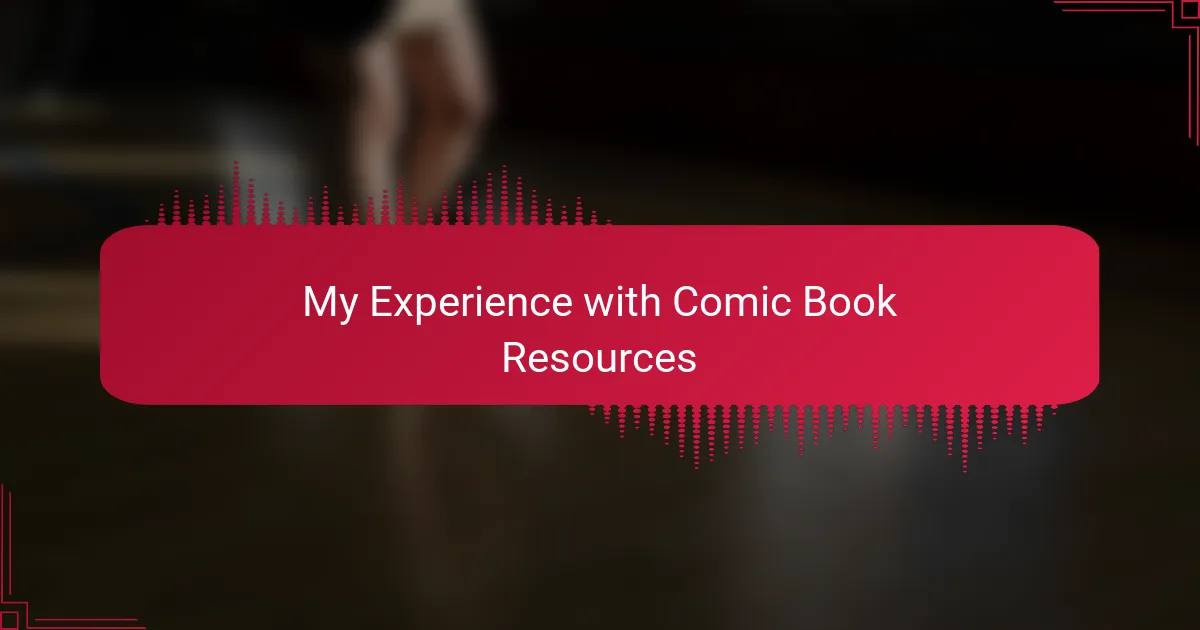Key takeaways
- Comic book resources encompass a variety of tools, including writing guides, software tools, and community forums that support creators in their work.
- Author resources are essential for creative guidance, helping writers and artists develop their skills and connect with industry trends.
- Engaging with local communities and online networks provides opportunities for collaboration, inspiration, and access to valuable information.
- Adaptability and leveraging feedback from peers are crucial for growth in storytelling and staying relevant in the ever-evolving comic book landscape.
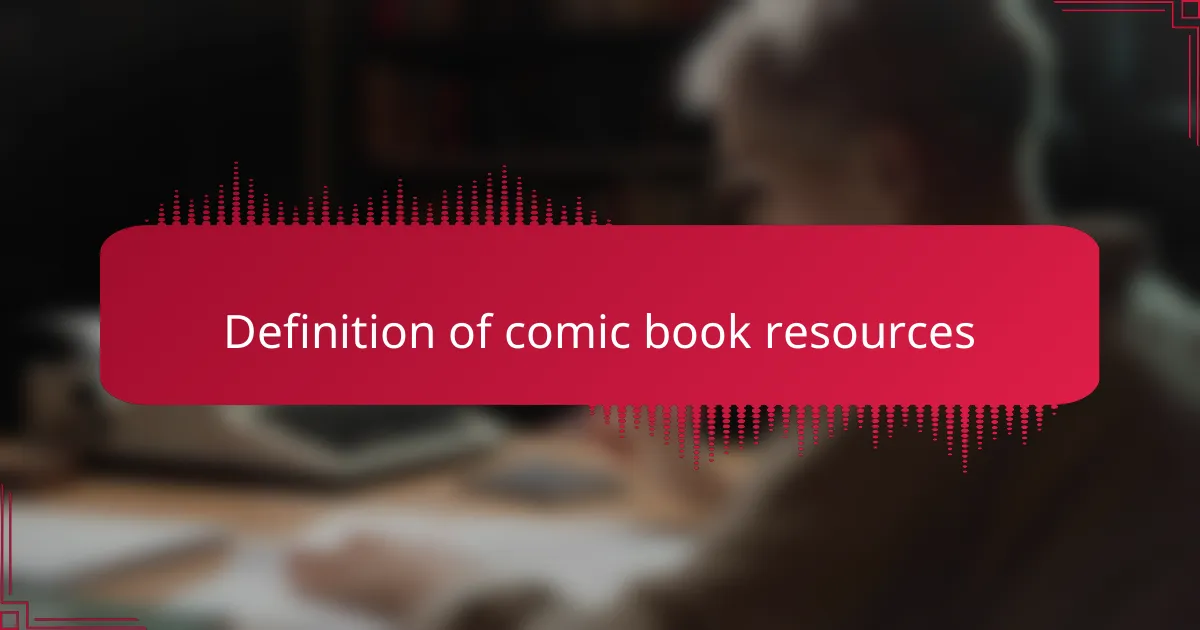
Definition of Comic Book Resources
Comic book resources are a diverse collection of tools, materials, and references that support authors in the creative process. These can range from writing guides and drawing tutorials to platforms for collaboration and feedback. I remember the first time I stumbled upon a comprehensive resource website; it opened my eyes to a wealth of knowledge I didn’t realize existed.
What really struck me about comic book resources is their ability to connect creators with an audience, providing insights into trends and reader preferences. There’s something invigorating about accessing online forums where artists and writers share their experiences and tips. Have you ever found a gem of advice that changed the way you approach your work? I certainly have, and it was a game-changer for my own writing.
Additionally, comic book resources include publisher guidelines, distribution platforms, and marketing strategies tailored specifically for comic creators. Knowing where to find these critical resources can often make the difference between success and obscurity in the comic book world. I recall one late night spent combing through publisher requirements; it felt daunting, but ultimately empowering to navigate those waters.
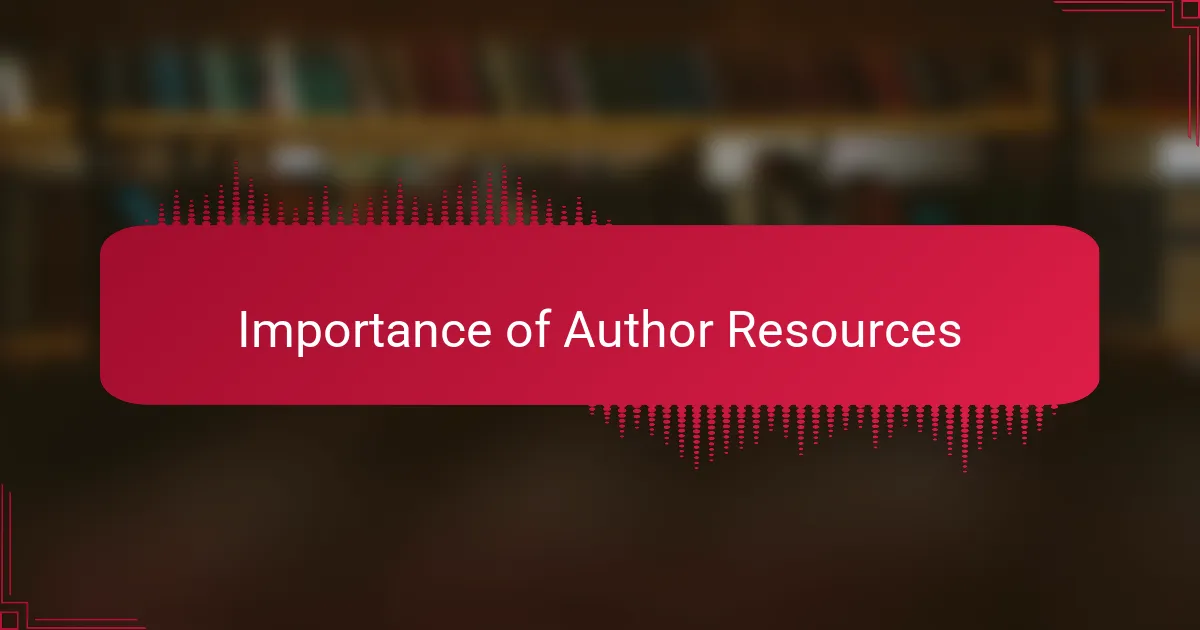
Importance of Author Resources
Author resources are essential for comic book creators as they provide guidance and support throughout the writing and illustrating process. I distinctly remember the relief I felt when I discovered a resource that detailed character development techniques; it transformed my storytelling. Without such resources, I would have struggled to create relatable and engaging characters.
Moreover, these resources often highlight industry standards and best practices, which can be incredibly beneficial for new authors trying to find their footing. I once participated in a workshop that focused on panel layout, and it completely shifted my perspective on pacing. Have you ever had a moment like that where a tiny shift led to a breakthrough in your creative work?
Accessing the right author resources enables us to stay updated with current trends while also honing our craft. It’s like having a mentor available at any hour, ready to offer insights that inspire and challenge us. I’ve often turned to online communities, not just for advice but for the encouragement that lifts me during creative slumps. They keep the passion for storytelling alive, reminding us we’re not alone in this journey.
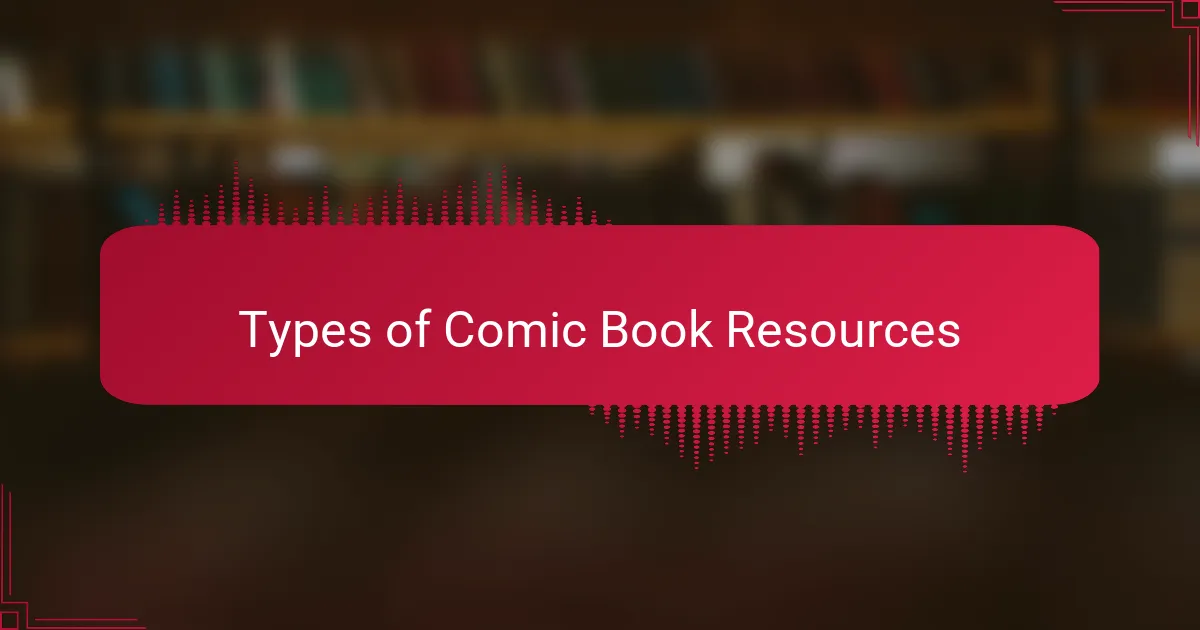
Types of Comic Book Resources
When it comes to comic book resources, I’ve found that they can be broadly categorized into several types. Firstly, there are instructional books and guides. I remember picking up “Understanding Comics” by Scott McCloud, which truly reshaped my understanding of the medium. Then, we have online platforms and forums, which can connect creators worldwide. I often visit places like Comic Book Resources and Reddit’s r/comicbookwriters, where discussions can lead to inspiration and collaboration.
Another essential resource is software tools for creating comics. I’ve spent countless hours using programs like Clip Studio Paint and Canva, which elevate my art and streamline the design process. The thrill of using these tools to bring my stories to life is something every creator should experience. Finally, there are local comic book shops and conventions, which not only provide physical resources but also foster community and networking opportunities.
| Type of Resource | Description |
|---|---|
| Instructional Books | Guides that teach the art and craft of comic creation. |
| Online Platforms | Websites and forums where creators can share ideas and collaborate. |
| Software Tools | Digital applications for creating and designing comics. |
| Local Comic Shops | Community hubs where resources and networking opportunities abound. |
| Conventions | Events that connect creators and fans, offering workshops and showcases. |
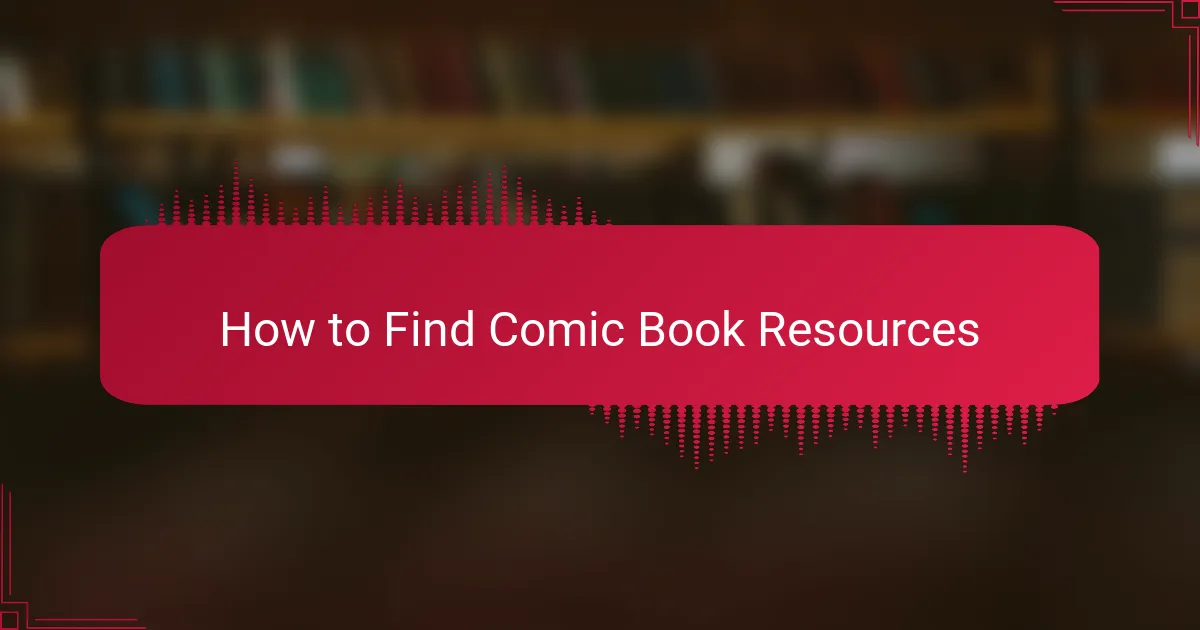
How to Find Comic Book Resources
Finding comic book resources can be an exciting adventure if you know where to look. I remember my early days of searching for guidance; I often turned to social media. Platforms like Twitter and Instagram are filled with creators sharing invaluable tips and tricks. Have you ever followed a hashtag that led you to useful insights? I certainly have. It’s like opening a treasure chest of knowledge.
Another fruitful avenue is online forums and communities tailored specifically for comic creators. I recall joining one of these forums, feeling the camaraderie among fellow writers and artists. We all shared our struggles and triumphs, and that sense of belonging made the quest for resources feel less daunting. Have you found your tribe yet? Connecting with like-minded individuals can open up a world of opportunities and collaboration.
Don’t underestimate the power of local libraries and comic shops either. They often host workshops or have resource sections that can surprise you. I remember stumbling upon a few workshops that not only provided practical tools but also inspired me to push my creative boundaries. Have you checked if your local community offers any comic-related events? Engaging with your local scene can lead to unexpected partnerships and learning experiences that truly enrich your craft.
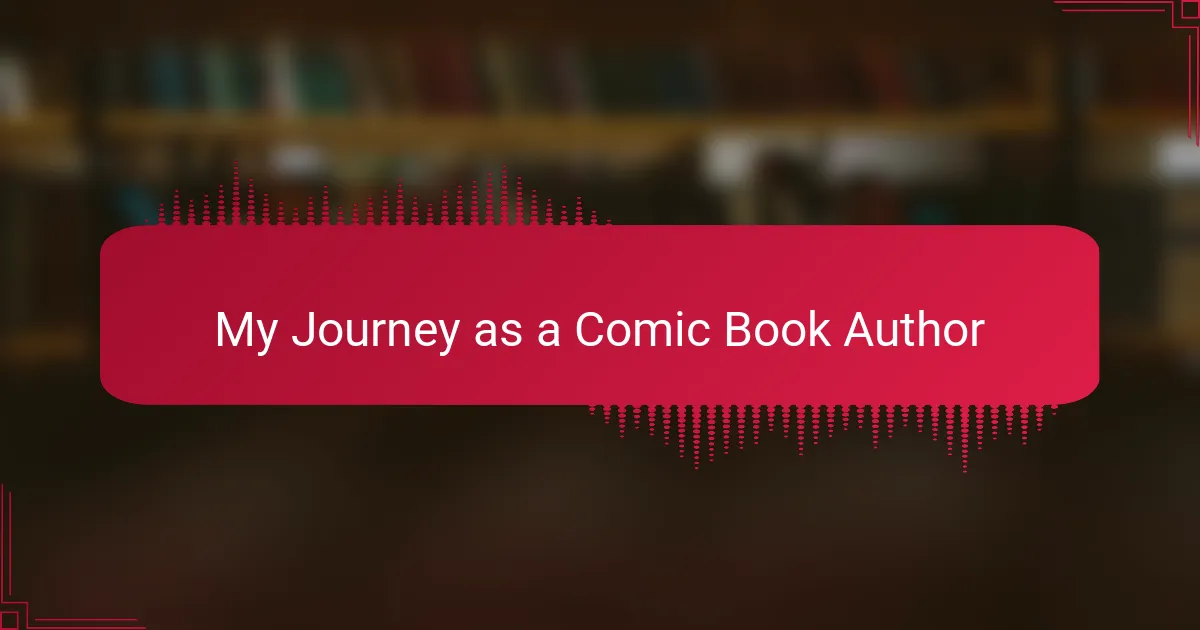
My Journey as a Comic Book Author
As I embarked on my journey as a comic book author, the thrill of creating my own characters and stories was unlike any other experience I had encountered. I remember sitting at my desk, surrounded by sketches and script drafts, feeling a mix of excitement and apprehension. Every page I filled with ink was not just a step toward my goal but a piece of my heart poured onto paper.
I often turned to various resources that provided invaluable insights into the craft. Here are some that particularly shaped my path:
- Books on Comic Structure: Reading about pacing and panel layout transformed my storytelling.
- Online Workshops: Engaging with seasoned professionals opened my eyes to different techniques and nuances I hadn’t considered.
- Social Media Groups: Connecting with fellow aspiring authors gave me a support system and space to share ideas and feedback.
- Conventions and Expos: Attending events allowed me to network and gain inspiration from established artists and writers.
- Art Supply Recommendations: Discovering various tools for drawing enhanced my creative process and helped refine my technique.
These resources guided me, and each experience added further depth to my storytelling voice.
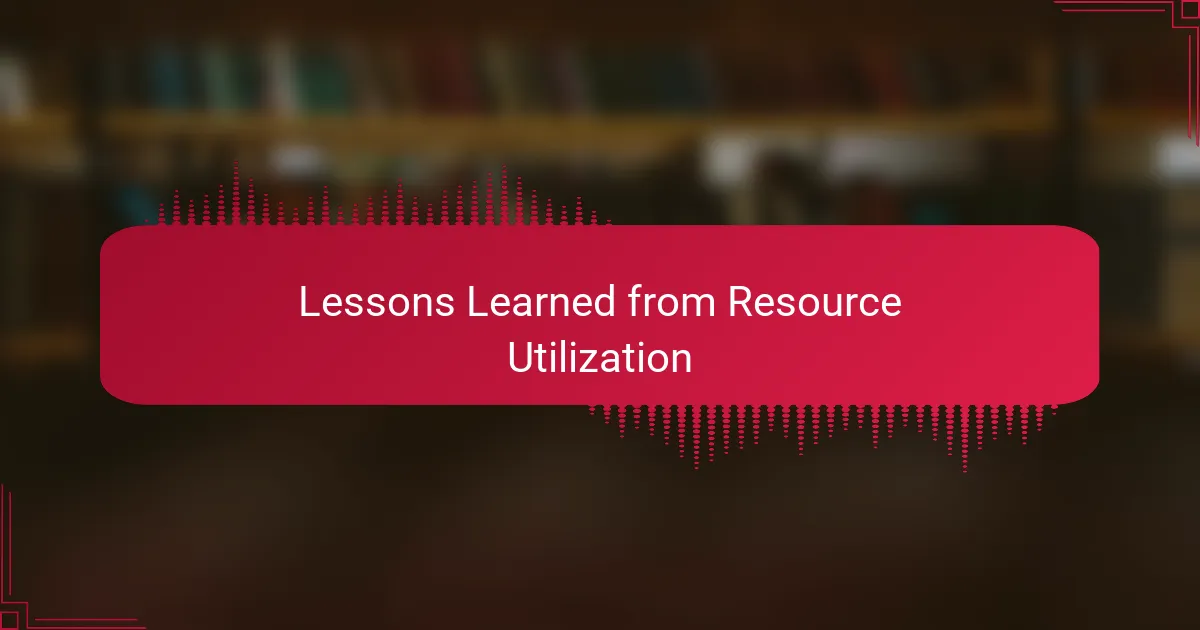
Lessons Learned from Resource Utilization
Utilizing comic book resources has taught me the importance of adaptability in my creative journey. I remember a particularly challenging moment when my initial concept for a story fell flat after sharing it in an online workshop. Instead of despairing, I took the feedback to heart and used various resources to reshape my narrative. This experience reinforced that flexibility can turn setbacks into opportunities for growth.
One profound lesson I learned is the value of community. Attending a local convention opened my eyes to the wealth of shared knowledge among creators. I engaged in discussions that sparked ideas I had not considered before. Have you ever found inspiration in a casual conversation? I certainly have, and it illuminated the powerful role collaboration plays in creative development.
Lastly, staying informed about industry trends is crucial. Each time I read up on emerging styles or popular themes, I can feel the pulse of what resonates with audiences. There was a time when I felt disconnected from trends, and it showed in my work. By utilizing resources that kept me updated, I was able to refine my approach and create stories that felt timely and relevant. Isn’t it fascinating how knowledge can directly influence creativity?
